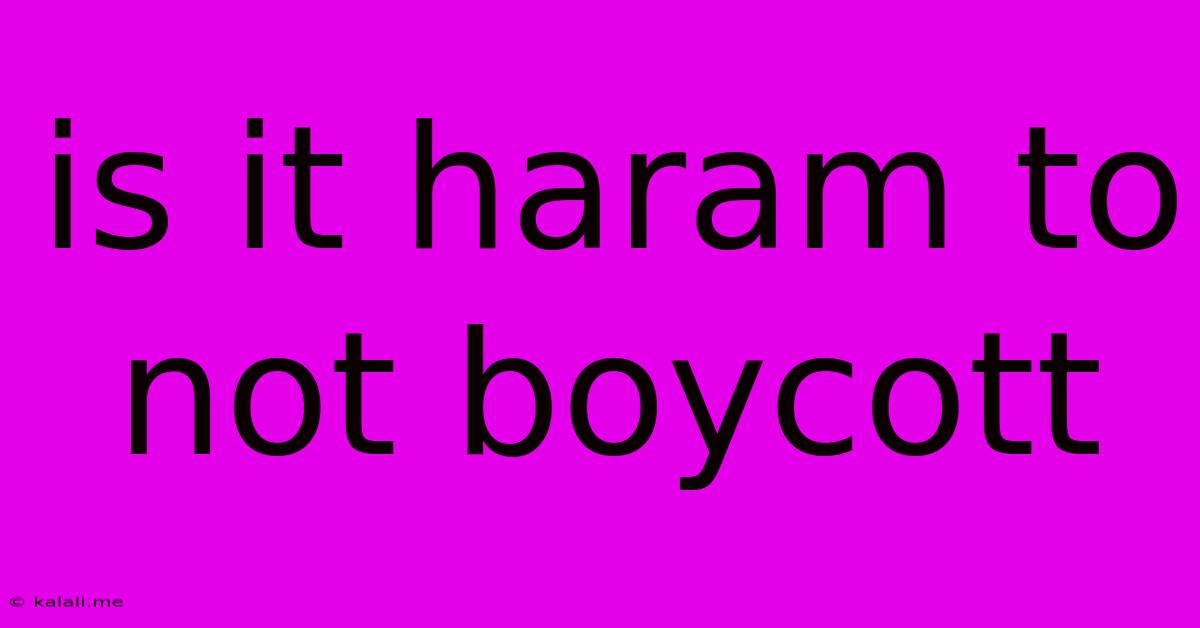Is It Haram To Not Boycott
Kalali
May 19, 2025 · 3 min read

Table of Contents
Is It Haram to Not Boycott? A nuanced look at Islamic perspectives on boycotts
The question of whether it's haram (forbidden in Islam) to not boycott is complex and lacks a straightforward yes or no answer. Islamic jurisprudence doesn't offer a blanket ruling on boycotts, as the permissibility hinges on the specific context and intentions behind both the boycott and the decision not to participate. This article explores the various Islamic perspectives and factors to consider when navigating this ethical dilemma. Understanding the intricacies of Islamic law and ethical considerations surrounding boycotts is crucial for Muslims making informed decisions.
The Islamic Principles at Play
Several core Islamic principles influence the ethical considerations surrounding boycotts:
-
Justice (عدل): Islam strongly emphasizes the importance of justice and fairness in all dealings. Boycotts are often employed to address perceived injustices, such as oppression, exploitation, or unethical practices. The intention behind a boycott – whether it aims to promote justice or inflict harm – is crucial in determining its permissibility.
-
Haram (حرام): Activities explicitly forbidden in Islamic law, such as theft, adultery, and murder, cannot be supported or indirectly facilitated through a boycott. Conversely, boycotts aimed at preventing these haram acts might be considered permissible.
-
Halal (حلال): Conversely, actions permitted or encouraged in Islam, such as supporting ethical businesses or promoting fair trade, may align with participating in boycotts that advance these goals.
-
Cooperation (تعاون): Islam encourages cooperation and mutual support within the community (ummah). However, this doesn't extend to supporting unethical or unjust practices. Therefore, cooperation with those perpetrating harm might necessitate a boycott.
-
Mitigation of Harm (درء المفاسد): Islamic jurisprudence emphasizes preventing harm and mitigating its effects. If a boycott is deemed necessary to prevent significant harm, participating may be seen as a moral obligation.
Factors Determining the Morality of Participation (or Non-Participation)
Several factors must be carefully considered before deciding whether or not to participate in a boycott:
-
The nature of the boycotted entity: Is the boycott targeting a company engaged in unethical practices, such as producing harmful products or exploiting workers? Or is it directed against a group or individual based on discriminatory reasons? The justification for the boycott significantly impacts its ethical status.
-
The intention behind the boycott: Is the boycott genuinely aimed at addressing injustice and promoting positive change, or is it driven by ulterior motives? A boycott intended to cause harm without a justifiable reason is considered morally questionable.
-
The potential consequences: What are the potential ramifications of participating or not participating in the boycott? Will it disproportionately harm innocent parties or create unintended negative consequences?
-
Available alternatives: Are there alternative options available that could achieve the same goals without resorting to a boycott? Exploring these alternatives is crucial before taking a stance.
-
The legitimacy of the organizing body: Is the boycott organized by a credible and trustworthy group with transparent goals and processes? A boycott organized by a questionable entity could undermine its legitimacy.
Conclusion: A Case-by-Case Assessment
Determining whether it's haram to not boycott requires careful consideration of the specific circumstances and a thorough understanding of Islamic principles. There's no universal answer. Muslims must engage in thoughtful reflection, weighing the relevant factors before deciding whether to support or oppose a specific boycott. The emphasis should always be on upholding justice, preventing harm, and promoting ethical conduct. Consultation with knowledgeable Islamic scholars can also be beneficial in navigating this complex issue. Ultimately, the decision should align with one's conscience and understanding of Islamic teachings.
Latest Posts
Latest Posts
-
How To Drain The Water From A Toilet
May 20, 2025
-
How To Get Oil Out Of Wood
May 20, 2025
-
What Does It Mean To Air Someone
May 20, 2025
-
I Know That I Do Not Know
May 20, 2025
-
They See Us Rollin They Hatin
May 20, 2025
Related Post
Thank you for visiting our website which covers about Is It Haram To Not Boycott . We hope the information provided has been useful to you. Feel free to contact us if you have any questions or need further assistance. See you next time and don't miss to bookmark.